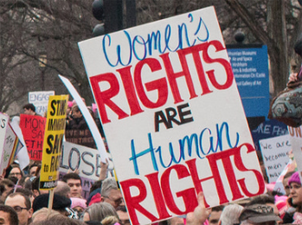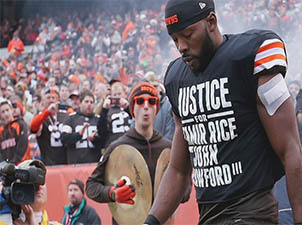
Being a Woman of Color in the Trump Era
LaTreviette Matthews
November 8, 2017
Historically our country has viewed women and people of color –especially those on the low end of the socio-economic scale– as second-class citizens. Never before, however, had I experienced so many emotions for just being me than I did after the 2016 election. The first thing I felt was a tremendous amount of fear. After the election, there seemed to be a rise in hate crimes and attacks on unarmed men and women of color. I did not want to leave my house. Subsequently the fear left me and I turned to anger. I felt angry that after having an African American president for two terms, now in the year 2017, people of color were still being treated like they are less deserving of being in this country than everyone else. I felt the pain of my ancestors and was ready for war against white supremacy and white privilege.
When fighting for the right to self-determination, people of color have endured pain and resistance. I did not want to do things the old fashion way by engaging in non-violent protests, boycotts, demonstrations, and marches. I vacillated between fight and flight, all the while determined to protect myself and my family at all costs. My emotions were beginning to change again. I was in limbo. I was still angry but now angry with a purpose. I wanted to do something. For centuries people of color have tried many forms of fighting back against racism and injustice. I wanted to do something that was going to make a difference. This presidential election was the catalyst for my ferocity. Uncertain of my future and armed with a fierce determination, I sought community support.
Before last year, I did not consider myself a political person. I did vote in the last five presidential elections; I felt it was important for my vote to be counted. However, for presidential elections held before then, I was uninterested in social political activism and did not understand the importance of having my voice heard through voting. Although I was aware that people fought very hard in this country for African Americans to vote, it did not dawn on me that my voice would make a difference today. Growing up as a young woman of color, I did not have someone like Sister Simone at my high school or college to discuss my political views, encourage me to go to a protest, or show me how joining a political group could make a difference. I thought the political stuff was best left up to the adults.
I believe everything happens for a reason. I am convinced that this backlash against Obama’s presidency happened in order to shake things up and to awaken people to the injustices happening in this country; injustices that have gone on for far too long. Aside from racism, sexual harassment and assault, just to name a few, are issues that have impacted me the most following the 2016 election. Over the past five years working at NETWORK, I have become more political in my views, more involved, and more “WOKE.” As a woman of faith, I know that life and death are in the power of the tongue. As a woman of color, I know the double standard that comes with freedom of speech.
Today, social media and “fake news” seem to have surpassed the reach of traditional media. In spite of its limitations, social media has become a platform for getting voices heard. To that end, I commit to using my platforms to hold people accountable for their actions. I have joined racial justice groups and forums in hopes to educate myself and others about racism and the challenges that people of color face in the United States. Today I am more hopeful and more connected. Women of all races are rising up and raising their voices. This makes me proud to be a woman of color in the fight for racial justice and social justice.











